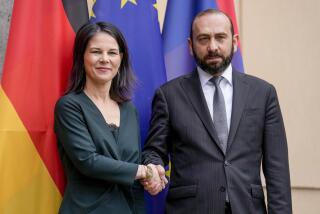German Reunification Close at Hand, Kohl Says : Europe: Talks with the East may begin even before March elections there, Bonn’s foreign minister adds.
- Share via
BONN — Chancellor Helmut Kohl said Thursday that German reunification is close to becoming a fact.
“We have never been so close to our goal--the unity of all Germans in freedom--as we are today,” Kohl said in an address to the Bundestag, the lower house of Parliament.
At the same time, Foreign Minister Hans-Dietrich Genscher told West German Radio that talks on unification with East German officials will begin as soon as possible, possibly even before March 18, the date scheduled for national elections in East Germany.
“We don’t want to lose any time,” Genscher said.
He said that such talks were implicit in the accord announced Tuesday in Ottawa by the United States, the Soviet Union, Britain and France, the Allied powers that defeated Germany in World War II.
The Ottawa accord provides a broad outline of the unification process, starting with a meeting of the two German foreign ministers as soon as possible after the East German election.
Once they agree on a proposed blueprint for the internal reunification issues, they would meet with their counterparts from Washington, London, Paris and Moscow to discuss security and external issues affecting the superpowers and neighboring countries. Then the whole package would be submitted to the Conference on Security and Cooperation in Europe by the end of the year.
Kohl, in his Bundestag address, thanked Soviet President Mikhail S. Gorbachev for not standing in the way of German unity. Gorbachev, who had been cool to the idea of German unity, said over the weekend that Germany’s future should be decided by Germans.
Kohl also thanked his Western allies for supporting West Germany through the difficult years of the East-West Cold War.
He accused the West German Social Democratic Party of being too supportive of the ousted, disgraced East German Communist leader Erich Honecker.
“You were allied with these people,” he said.
The Social Democrats in the audience responded with booing and hooting that interrupted his address for several minutes. Hans-Jochen Vogel, head of the Social Democrats, reminded Kohl that Kohl’s Christian Democrats are supporting the Christian Democratic Party of East Germany, which for years was allied with the Communists.
Kohl reiterated his position that a unified Germany will continue to be a member of the North Atlantic Treaty Organization, under a proposed plan that would bar NATO troops after reunification from territory that is now East Germany.
“The history of this century,” he said, “shows that nothing is more detrimental to European stability than a Germany that swings between two worlds, between East and West. The imperative stability factor needed in the middle of Europe is a free and democratic Germany as part of a secure alliance, and a growing political and economic integration with the European Community.”
He said the new Germany would respect the security interests of all.
Kohl emphasized that the East Germans cannot expect substantial financial help from Bonn until they institute radical reforms. And he sought to quiet East German fears that monetary union will result in widespread unemployment, lower pensions and diminished savings.
“Our compatriots in East Germany,” he said, “can count on our solidarity. As we see it, a market economy and social security cannot be separated.”
In Ottawa, Soviet Foreign Minister Eduard A. Shevardnadze cautioned the two Germanys against moving too quickly toward unification.
“Some politicians would like to play a political game of rapid chess with a five-minute time limit,” he told a joint committee of Canada’s Parliament. “Is this a sensible thing to do when peace and the security of all nations, without exaggeration, are at stake?”
Shevardnadze again raised the idea of holding a referendum:
“The idea of an all-European referendum involving Canada and the United States (is needed) in order to investigate . . . public opinion in Europe (regarding) German unity,” he said.
He said while no one doubts the right of self-determination for the two Germanys, the rest of the world is legitimately concerned about the rebirth of Nazism.
More to Read
Sign up for Essential California
The most important California stories and recommendations in your inbox every morning.
You may occasionally receive promotional content from the Los Angeles Times.













